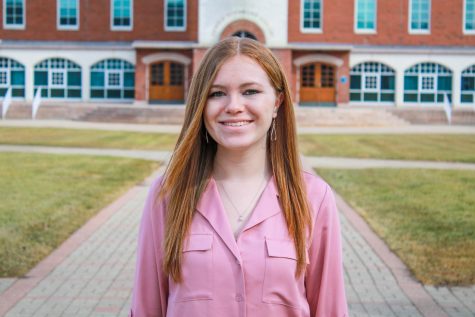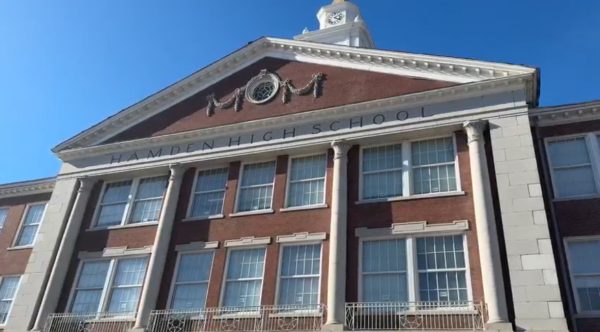Quinnipiac University President Judy Olian responds to COVID-19’s impact on the university
Olian joined Q30 News Director Brooke Reilly for an exclusive interview surrounding the impact that the coronavirus has had on the university
Dr. Judy Olian joined Quinnipiac University as its ninth president on July 1, 2018. The university held an inauguration ceremony for her exactly one year ago today on May 1, 2019, but a lot has changed since then.
“The last two years are hard to characterize in some sense because they have been so different and packed. And, I think, in a sense, unprecedented,” Olian said. “I feel really terrific about the community that we’re part of. And, you see it when it gets tough, and it is tough now, and the community has come together beautifully.”
Olian reflected on how different the two years have been that she’s served as president, stating that her first year included getting to know the campus community, developing the university’s five-year strategic plan, community relations, hiring new university leaders and creating new positions.
She said that her second year has been predominantly shaped by the university’s response to COVID-19.
“The flexibility of our students, of our faculty and staff, the commitment that everyone has to continue the vitality and the academic programs of Quinnipiac has really carried us forward in a way that just demonstrates the strength of all that Quinnipiac stands for,” Olian said.
The university created a COVID-19 task force team at the end of January to begin preparing for the impact that the virus could potentially have on Quinnipiac’s classroom instruction and life on campus. The team consists of medical, facilities, academic and administrative leaders and has been meeting virtually every day since late January.
“They are really looking at all of the responses and anticipatory events that we need to engage in, in order to secure the health and well-being of our community [faculty, staff, students and neighboring communities],” Olian said.
Olian said that the team has begun thinking about and developing plans for the future as both an immediate response to what coming back in the fall might look like and recovery for post COVID-19. The university has created four planning groups to prepare for this. These include the COVID-19 Task Force, chaired by Associate Vice President for Facilities Operations Keith Woodward, the Fall 2020 Planning Group, chaired by Vice President for Equity and Inclusion Don Sawyer, the Faculty Senate ad-hoc COVID-19 response committee, chaired by Professor Stephen Straub and the Reimagining Task Force, chaired by School of Communications Dean Chris Roush.
“A second task force is now the fall planning and task force, which has gotten in gear especially over the last couple of weeks,” Olian said. “It’s working daily with its first reports to any day now to establish alternative scenarios around how we return in the fall to classes and what parameters might need to be managed.”
Olian said that some things that are being looked at are how to manage on-ground courses and residence halls while maintaining social distancing. She stressed the importance of following the governor’s orders for the entire state of Connecticut when it comes to reopening the university.
The goals of the four pillars for the university outlined in the strategic plan that Olian developed will remain the same despite the current circumstances. These goals are to “build an institution-wide mindset that prepares graduates for 21st-century careers and citizenship, create an inclusive, excellence-driven community, nurture and positively impact internal, local and global communities and foster lifelong connections and success.” This was released in May of 2019.
“Those are goals for the university of the future, and they’re going to remain the goals for our institution,” Olian said. “The question is have we learned some things around this crisis? The way we’re working remotely, the way we’re delivering remotely, the way some individuals might have preferences. The services are a broad array of choices that will make the strategic plan even better, but I don’t think the broad vision is going to change.”
The Facilities Master Plan is still on track to be released in May. The university is proceeding with a new Health and Wellness Center, but the timeframe may be delayed by several months according to Olian.
“We are completing the three residence halls that are on tap, and we will continue to invest in research facilities, faculty learning facilities, residence halls and the social environments, like the On the Rocks pub that we just completed before the COVID crisis, so all of that will continue,” Olian said.
COVID-19 had a major impact on the university’s finances costing about $40 million. This comes from the need to refund students for housing and dining plans, along with the concern of losing a portion of tuition for summer courses.
“In the end, we had to cut a significant amount from our budget,” Olian said. “We had the financial strength to be able to do that through June 30 without impacting any of our faculty or staff. That was a very important priority for us to the extent that we can to keep the Quinnipiac community whole.”
Faculty and staff are experiencing 3% and 5% salary reductions in accordance with their annual salaries through June 30. Olian and other members of the management committee are receiving higher pay cuts.
“What happens on July 1 in the next fiscal year will very much depend on how enrollments shape up and returning students return for next year,” Olian said. “You may know that many institutions, including our own, pushed back the enrollment deposit date for first-year students to June 1 from May 1, so we still have to see how that shapes up.”
The university has not laid off or furloughed any of its employees. Olian said that is the last resort in the future.
“Our faculty and staff have made enormous sacrifices,” Olian said. “Some are working around the clock, literally, and doing that, despite the fact that they’ve incurred salary cuts, so I’m confident that our community will rally.”
Moving forward, Olian said that in-person commencement ceremonies for the class of 2020 will still take place when it is safe to do so. She encourages all students looking for jobs and internships to utilize Quinnipiac’s alumni network and noted that an email was sent to them asking to assist students with any leads they may know of at their jobs.
She said that all students should also attend as many virtual events as possible and stay connected with the Quinnipiac community during this time.
“Whether it’s as students or faculty or staff, you are doing something special to take us through this crisis and get us through to the other side in a kind and generous way through your caring,” Olian said.
Stay with Q30 News as the university continues to develop future plans in response to COVID-19.

Brooke Reilly is a senior journalism major from Cornwall, NY. She is currently the News Director for Q30 TV. She has previously served in the roles of Executive Producer of the Q30 Newscast, Associate Producer of #THAT and Secretary of Q30 TV. Brooke is currently an intern at NBC News in New York City with the TODAY Show. She previously interned at KTLA 5 News and the FOX News Channel in Los Angeles...


